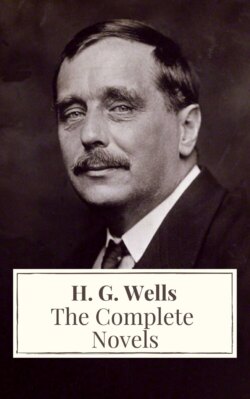Читать книгу The Complete Novels of H. G. Wells - H. G. Wells - Страница 84
На сайте Литреса книга снята с продажи.
The Owner of the Voice
ОглавлениеThere are works, and this is one of them, that are best begun with a portrait of the author. And here, indeed, because of a very natural misunderstanding this is the only course to take. Throughout these papers sounds a note, a distinctive and personal note, a note that tends at times towards stridency; and all that is not, as these words are, in Italics, is in one Voice. Now, this Voice, and this is the peculiarity of the matter, is not to be taken as the Voice of the ostensible author who fathers these pages. You have to clear your mind of any preconceptions in that respect. The Owner of the Voice you must figure to yourself as a whitish plump man, a little under the middle size and age, with such blue eyes as many Irishmen have, and agile in his movements and with a slight tonsorial baldness—a penny might cover it—of the crown. His front is convex. He droops at times like most of us, but for the greater part he bears himself as valiantly as a sparrow. Occasionally his hand flies out with a fluttering gesture of illustration. And his Voice (which is our medium henceforth) is an unattractive tenor that becomes at times aggressive. Him you must imagine as sitting at a table reading a manuscript about Utopias, a manuscript he holds in two hands that are just a little fat at the wrist. The curtain rises upon him so. But afterwards, if the devices of this declining art of literature prevail, you will go with him through curious and interesting experiences. Yet, ever and again, you will find him back at that little table, the manuscript in his hand, and the expansion of his ratiocinations about Utopia conscientiously resumed. The entertainment before you is neither the set drama of the work of fiction you are accustomed to read, nor the set lecturing of the essay you are accustomed to evade, but a hybrid of these two. If you figure this owner of the Voice as sitting, a little nervously, a little modestly, on a stage, with table, glass of water and all complete, and myself as the intrusive chairman insisting with a bland ruthlessness upon his “few words” of introduction before he recedes into the wings, and if furthermore you figure a sheet behind our friend on which moving pictures intermittently appear, and if finally you suppose his subject to be the story of the adventure of his soul among Utopian inquiries, you will be prepared for some at least of the difficulties of this unworthy but unusual work.
But over against this writer here presented, there is also another earthly person in the book, who gathers himself together into a distinct personality only after a preliminary complication with the reader. This person is spoken of as the botanist, and he is a leaner, rather taller, graver and much less garrulous man. His face is weakly handsome and done in tones of grey, he is fairish and grey-eyed, and you would suspect him of dyspepsia. It is a justifiable suspicion. Men of this type, the chairman remarks with a sudden intrusion of exposition, are romantic with a shadow of meanness, they seek at once to conceal and shape their sensuous cravings beneath egregious sentimentalities, they get into mighty tangles and troubles with women, and he has had his troubles. You will hear of them, for that is the quality of his type. He gets no personal expression in this book, the Voice is always that other's, but you gather much of the matter and something of the manner of his interpolations from the asides and the tenour of the Voice.
So much by way of portraiture is necessary to present the explorers of the Modern Utopia, which will unfold itself as a background to these two enquiring figures. The image of a cinematograph entertainment is the one to grasp. There will be an effect of these two people going to and fro in front of the circle of a rather defective lantern, which sometimes jams and sometimes gets out of focus, but which does occasionally succeed in displaying on a screen a momentary moving picture of Utopian conditions. Occasionally the picture goes out altogether, the Voice argues and argues, and the footlights return, and then you find yourself listening again to the rather too plump little man at his table laboriously enunciating propositions, upon whom the curtain rises now.
